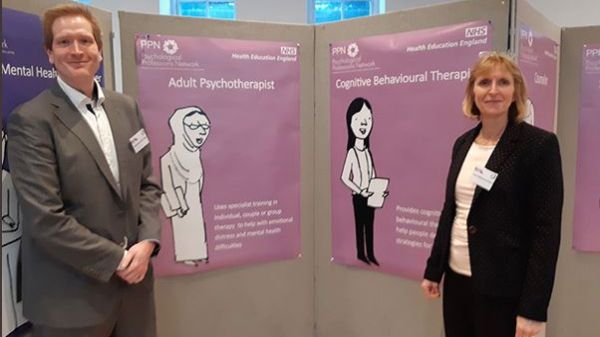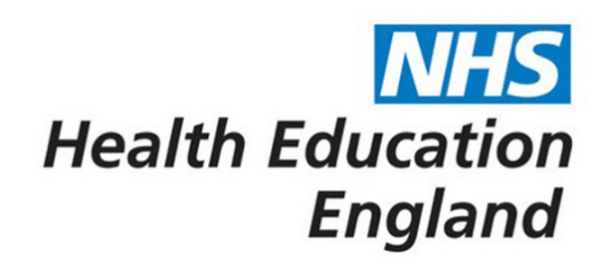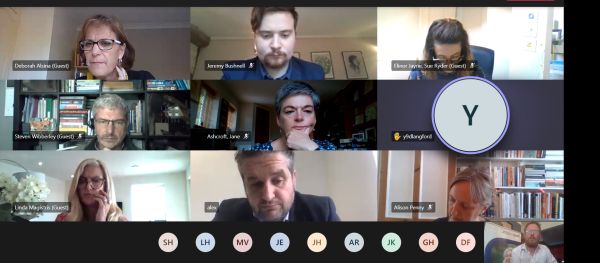Working with governments and stakeholders
Our submission to the Comprehensive Spending Review
Our Policy Team prepared a 10-point submission to the government’s Comprehensive Spending Review (CSR) calling for investment in counselling and psychotherapy.
Our submission led with our campaign for funding for a national programme of school-based counselling for England. It also included recommendations around Covid-19, VAT and bereavement support.
Our asks were:
- Invest in a trained, professional counsellor in every secondary school and college in England to meet the growing mental health crisis facing young people.
- Develop a cross-departmental Mental Health Action Plan to respond to Covid-19.
- Extend a VAT exemption to all individual Professional Standards Authority registered and accredited members and registrants who are qualified psychotherapists and counsellors removing unnecessary barriers to access mental health support.
- Fund research into the impact of Covid-19 on care home residents and staff and how evidence-based non-pharmacological interventions, such as counselling and psychotherapy, can improve their mental health and wellbeing.
- Additional funding for bereavement support to ensure consistent access to quality services and for appropriate bereavement services specifically designed to support people who have lost loved ones to Covid-19.
- Invest in relationships by providing free relationship counselling to lower-income families enabling more people to benefit from this cost-effective support.
- Strengthen the UK’s economic recovery from Covid-19 by supporting employers, employees and vulnerable groups through workplace counselling.
- Increase in the NHS Funding Settlement to ensure the NHS Long Term Plan can be implemented in light of Covid-19.
- Longer term funding settlement for Health Education England.
- Enhance the role of counselling and psychotherapy within the NHS workforce.

Covid-19 campaign roundtable
We brought together the 26 partners of our Covid-19 campaign for an online roundtable to discuss putting counselling at the centre of the government’s Covid-19 response.
They were joined by representatives from important allies including the Centre for Mental Health, Rethink Mental Health, the Royal College of Psychiatrists and the British Psychological Society.
Hosted by BACP, BPC and UKCP, the roundtable included contributions from Labour’s Shadow Minister for Mental Health, Dr Rosena Allin-Khan MP; Sir Norman Lamb, chair of the Children and Young People’s Mental Health Coalition; and Paul Jenkins, chief executive of the Tavistock and Portman NHS Trust.
Topics included the importance of using the existing trained and under-utilised therapy workforce, access to and choice of therapies, highlighting the accredited registers programme and the impact of Covid-19 on different groups.
Steve Mulligan, our Four Nations Lead, who organised the event, said: "This was an important opportunity for us to listen, share ideas and collaborate with leading thinkers across the mental health sector.
“It aimed to help us secure the greatest possible impact with our campaign to ensure our members’ work is at the heart of the government’s response to Covid-19.
"At the outset of this crisis we worked rapidly to draw together partners from across the counselling sector together with key mental health allies to strengthen our campaign.
"We look forward to continuing to collaborate to give us the greatest chance of success."

Jo Holmes, our Children, Young People and Families Lead, and Duncan McCaig, our Senior Research Lead, have been working with Professor Mick Cooper and Dr Jess Bryant from the University of Roehampton on school and college-based counselling research.
They designed, developed and delivered a UK-wide research questionnaire with a focus on the impact of Covid-19 on the profession. It was completed by nearly 750 practitioners.
The results indicated around half of all therapy had stopped, highlighting issues around schools closing, therapists unable to offer online provision or young people not having access to suitable devices or a confidential space.
Changing landscape of school and college-based counselling
Jo Holmes hosted a free online webinar, aimed at members working in school and college settings.
She was joined by guest speakers Mick Cooper and Sarah Watson, our CYP Ethics Lead. Wendy Hay, our CYP Executive committee member, attended for a live Q&A. You can watch the webinar until 31 December.
As a result of the webinar, Jo has set up an expert reference group of up to 20 practitioners to help steer future campaign work.
School and college-based counselling campaign update
More than 4,000 letters were sent to MPs supporting our call for the Chancellor to fund school or college-based counselling in England as part of the Comprehensive Spending Review.
Jon Trickett MP gained cross party support for his early day motion supporting our ask. The second strand of our campaign call is for MPs to sign up to this motion.
The Liberal Democrats also formally supported our campaign and we’ve seen numerous parliamentary questions as a result of our members engaging with their MPs.
In September, we briefed Baroness Massey of Darwen ahead of her question in the Lords on support for children and young people during the pandemic.
During the debate she backed our campaign, saying: “Some 80% of young people say that their mental health has become worse during the Covid pandemic. Will the Government urgently expand services for young people through increased counselling in schools and community services? Otherwise, the human and financial costs will be enormous.”
In October, we briefed MPs ahead of a Westminster Hall debate on impact of Covid 19 on children and families. Jim Shannon, the DUP MP for Strangford, made a plea for UK Government to invest in school and college-based counselling in England to ensure equality of access across the UK.
Read Jo’s blog and Sandra Bell’s plea to members to support this campaign. Other organisations supporting the need for funded counselling provision in schools and colleges includes Young Minds, who we shared our costings with, The Centre for Mental Health and The Mental Health Foundation.

Find out more about our children, young people and families work
Healthcare
NHS Confederation Primary Care Network
Matt Smith-Lilley, our Policy and Engagement Lead for Mental Health, met leaders from the NHS Confederation’s Primary Care Network (PCN).
PCNs are a key building block of the NHS Long Term Plan and since July 2019 most GP practices in England are required to come together to form one of 1,300 PCNs across the country, each covering between 30,000 and 50,000 patients.
We discussed the potential for mental health services to be delivered through PCNs and the role counselling and psychotherapy, as well as our members, could play.
The discussions were productive and we're both keen to maximise the role and impact of the skills and experience of our members. We’re hoping to hear from members who may be working with Primary Care Networks to inform our work.

Psychological Professions into Action Campaign
Matt Smith-Lilley and Fiona Ballantine-Dykes, our Deputy Chief Executive, have been representing BACP on the development of the Vision for Psychological Professions Workforce document.
It's being developed by the Psychological Professions Workforce Group at NHS England and NHS Improvement and Health Education England.
Our members contributed to the development of the document through a consultation earlier this year.
The group’s work is important to the implementation of the mental health ambitions within the NHS Long Term Plan and is a key opportunity to secure further roles for our members in the NHS.
Through the current draft vision and the NHS Long Term Plan there are clear commitments to a substantial expansion of the psychological professions workforce, and we’re working with this group to maximise opportunities for members as well as identifying and working through barriers that prevent practitioners taking up roles within the NHS in England.

Matt Smith-Lilley and Fiona Ballantine-Dykes
Health Education England
We met Jo Lenaghan, Health Education England’s director for strategy and planning, to discuss maximising opportunities for members to be part of the NHS workforce.
The broad focus of discussion was the implementation of the NHS Long Term Plan and continuing to raise the profile of the skills and experience of our members among senior leaders of Health Education England.
With commitments to increasing budgets for mental health as part of the funding settlement for the NHS Long Term Plan, and a commitment to expand the mental health workforce to deliver services, now is an opportunity for counselling and psychotherapy to play a greater role in this work.
The discussions were positive and we’ll update on this work as it progresses.

The Campaign to End Loneliness launched its report into the psychological aspects of loneliness.
We’ve been part of the project group since the research’s inception in 2018 and were pleased to be invited to support its launch in a discussion webinar.
The research found psychological techniques such as CBT can be effective for people with chronic loneliness, which is part of a complex set of problems, or due to difficult life events such as bereavement, and we’ve emphasised the importance of autonomy and choice for clients considering talking therapies.
Bereavement and Covid-19
We published a joint briefing on bereavement with Cruse, which considers experiences of bereavement during the pandemic.
We took part in a discussion about older people bereaved during the pandemic, chaired by Deborah Alsina, chief executive of the older people charity Independent Age.
Attendees included Cruse, the National Bereavement Alliance, MacMillan, The Good Grief Trust, Marie Curie, service commissioners and providers.
There was consensus the pandemic provides an amplified interest in bereavement care and an opportunity to collaborate to address shortfalls and inconsistencies.
We’re supporting Covid-19 Bereaved Families for Justice’s call for government investment in tiered bereavement support.
This has been led by our member Kathryn de Prudhoe, whose father Tony Clay died from Covid-19 in April.
It calls for a range of funded support including helplines, professionally facilitated peer support groups and therapy groups, befriending services, counselling and, for those most in need, trauma informed psychotherapy. This was also included in our submission to the CSR.
Older People Expert Reference Group meetings
Our OPERG met at videoconferences in July and September, achieving higher attendance and representation from the four nations for the first time.
The group was joined by members of the Independent Age policy team interested in our input into their Minds that Matter report.
Members shared their experience of working with older clients during the pandemic and four of the group were recruited to deliver presentations as part of a Working With Older People CPD webinar event.

United Nations International Day of Older Persons
Experiences of members shared at our July OPERG meeting were incorporated into a blog to mark the 25th United Nations International Day of Older Persons (UNIDOP).
It was themed around how the pandemic has changed the way we approach ageing, and members shared reflections on the risks of older people being seen as an homogenous group, new clients attracted by telephone or online therapy and the emerging use of tech by older people in care homes to keep in contact with family and friends.
Our student member Susan Aston contributed to a second UNIDOP blog, highlighting the mental health needs of care workers.
We’ve worked hard to provide members with up to date and relevant information and support throughout the pandemic, recognising guidance differs across the four nations, is subject to frequent change and impacts members at national and local levels.
We’ve produced guidance on the available financial support, including the furlough scheme, self-employed income support and a range of grants to businesses. We also worked with representative bodies, including ACAS, the Federation of Small Businesses and IPSE, to highlight gaps in support that affect our members.
Joining forces with national campaign ExcludedUK, we’ve lobbied the Chancellor to raise the impact on therapists.
We’ve also supported the development of a counselling service that uses our members to provide support to ExcludedUK group. The counselling service is free to use and counsellors are paid a rate they choose – with many offering a reduced fee.
Workplaces and employer engagement: round up
Kris Ambler was interviewed by online learning provider Counselling Tutor as part of feature on employment for counsellors.
Kris talked about his Workforce Lead role and the strands of his work for the podcast, which was well received by members.
Meanwhile, we launched the findings of our report exploring the value of workplace counselling.
We highlighted that Covid-19’s impact on workplaces makes this is a critical time for employers to invest in employee wellbeing services, including counselling.
EAPs have often come to the attention of Kris, who is keen to listen to and where possible act on the concerns of our members.
We held productive discussions with AXA PPP, one of the largest private healthcare providers, to ensure members affected by changes to their recruitment standards had an extra three months to attain the BACP Accredited status required.
Discussions are ongoing and we’ve been invited to contribute to their developing mental health strategy, focusing on the professional standards of their providers and counsellors.

Find out more about our Workforce work
For further information about any of the articles in this issue, or to speak to our Policy team, please email publicaffairs@bacp.co.uk
